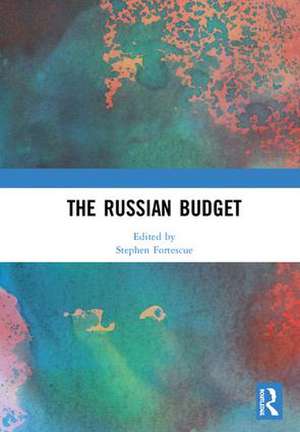The Russian Budget
Editat de Stephen Fortescueen Limba Engleză Hardback – 13 noi 2018
This book was originally published as a special issue of Post-Communist Economies.
| Toate formatele și edițiile | Preț | Express |
|---|---|---|
| Paperback (1) | 378.34 lei 6-8 săpt. | |
| Taylor & Francis – 30 iun 2020 | 378.34 lei 6-8 săpt. | |
| Hardback (1) | 764.20 lei 6-8 săpt. | |
| Taylor & Francis – 13 noi 2018 | 764.20 lei 6-8 săpt. |
Preț: 764.20 lei
Preț vechi: 1027.40 lei
-26% Nou
Puncte Express: 1146
Preț estimativ în valută:
146.25€ • 151.08$ • 121.72£
146.25€ • 151.08$ • 121.72£
Carte tipărită la comandă
Livrare economică 26 martie-09 aprilie
Preluare comenzi: 021 569.72.76
Specificații
ISBN-13: 9781138322721
ISBN-10: 1138322725
Pagini: 104
Dimensiuni: 174 x 246 x 13 mm
Greutate: 0.45 kg
Ediția:1
Editura: Taylor & Francis
Colecția Routledge
Locul publicării:Oxford, United Kingdom
ISBN-10: 1138322725
Pagini: 104
Dimensiuni: 174 x 246 x 13 mm
Greutate: 0.45 kg
Ediția:1
Editura: Taylor & Francis
Colecția Routledge
Locul publicării:Oxford, United Kingdom
Public țintă
Postgraduate and UndergraduateCuprins
1. Russian federal budget formation: introduction Stephen Fortescue 2. The social budget policy process in Russia at a time of crisis Marina Khmelnitskaya 3. The Russian budgetary process and defence: finding the ‘golden mean’ Julian Cooper 4. Russian experts: missing actors of the budget process Lev Jakobson 5. Amending budget bills in the Russian State Duma Ben Noble 6. The role of the executive in Russian budget formation Stephen Fortescue
Notă biografică
Stephen Fortescue is an Honorary Associate Professor at the University of New South Wales, Australia, and a Visiting Fellow in the Centre for European Studies at the Australian National University. He is a specialist on the Russian policy-making process, particularly as it relates to economic policy.
Descriere
This book is a study of the process by which the expenditure side of the Russian federal budget is determined. Budgetary policy issues and the actors and procedures involved in their resolution are examined. The chapters originally published in a special issue in Post-Communist Economies.
